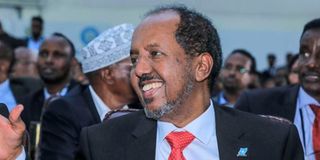Somalia’s election raises more questions than answers

Somalia President-elect Hassan Sheikh Mohamud.
Somalia now has a new parliament – and a president elected by its 329 lawmakers. This followed more than a year’s delay.
Somalis are asking whether President Hassan Sheikh Mahmoud – who previously ruled the country between 2012 and 2017 – will in his second stint chart the path to the promised land of reconciliation and development. Many will wonder whether this opportunity will be squandered, as it was during his previous tenure.
In my analysis, the outcome will depend on the interplay between the inertia of the profoundly corrupt process that produced parliament and the president, and the will of the new leadership to dare to introduce a transformative agenda. But the president’s first step of appointing several sectarian individuals to his office, and to the national security office appear to foreclose his promises of an inclusive political road map.
President Hassan has a once-in-a-lifetime opportunity to set an example by offering a consistent civic voice matched by progressive policies and institutional reform.
A flawed electoral process
Somalia has arguably one of the most fraudulent political systems in the world. Its people have been denied the vote since 1969. The partnership between a corrupt elite and the terrorist organisation Al Shabaab has created a countrywide open political prison in which the citizens are cowering observers.
Al-Shabaab dominates South-Central Somalia and has infiltrated cities. Meanwhile, the political class operates in a few areas, such as Mogadishu, as they hunker in their barricaded villas and circulate in severely restricted spaces in their bullet-proof Land Cruisers. These conditions are the byproducts of past blunders.
About two decades ago, warlords and sectarian politicians concocted a vile tribal formula supposedly reflecting people’s political identity. This formula balkanised Somalis into tribal political groups denying them the possibility of civic identity as apartheid South Africa did to the African population.
Two political changes emerged from this formula. First, the country was divided into tribe-based federal provinces. Second, traditional authorities were granted the right to represent their groups in the political arena. In the process tribal chiefs have become the de facto selectors of parliamentary representatives.
Once the tribal provinces had been established, conflict emerged between the governors of those regions and traditional leaders, both angling for power. The governors, who control the provincial administration and security forces, used this leverage to weaken the chiefs’ role during the recent “election”. Consequently, they were able to appoint MPs loyal to them.
Meanwhile, the former president and his political allies handpicked and installed loyalist governors in three of the five provinces. Thus, “electing” new MPs resulted in an epic struggle between the former president and his regional allies, and two opposition governors and other politicians. Such politicking corrupted every government agency.
Another major problem was the infusion of corrupt money into the parliamentary and presidential campaigns. The selection of candidates in most provinces did not attract much money as governors singularly controlled the levers of power and selected loyalists. In a few cases where there was real competition between candidates, the payment of bribes was almost the single most important winning factor.
These shenanigans delayed the election. Finally, the two houses of parliament selected their officers only two months ago. A week later parliament appointed a joint committee to organise the election of a president in two weeks: May 15 was D-day.
Corruption
The list of hopeful presidential candidates was very long. In a country where the average person earns less than $2 a day, each of the 39 presidential candidates paid the astonishing sum of $40 000 to register as a presidential candidate. This requirement was determined by the former president and his team. Once registered, candidates lobbied the MPs who would be electing the president.
In the absence of political parties or ideologies, the only distinction between candidates was the size of their campaign chests and genealogical identity.
Five candidates dominated the money game: two former presidents, the incumbent, a regional governor, and a former prime minister. Courting the MPs intensified the week before the election, but it was the eve of Election Day that MPs went scavenging for the big bribes. Candidates reportedly paid bribes ranging from $30 000 to $90 000 per MP.
This culture of corruption permeates all levels of society and everything that comes under the domain of the state. Confronting this demon will require far-sighted and determined leadership, and a revolutionary movement.
The hope
To earn the confidence of the people, the new president must, at a minimum, take on the following:
Endeavour to reverse the tribalisation of political identity.
Radically restructure the tribally-based federal system to undo the exclusive tribal fiefdoms.
Admit the role of corruption in the election and appoint an independent election commission consisting of the most credible Somalis to lead the country out of the current cul de sac.
Craft and apply radical strategies to defeat Al-Shabaab or reconcile with it.
The first signal of the president’s intention and agenda will be his nomination of the prime minister. If he selects a candidate with integrity, civic capital, and independence that will indicate his commitment to serious reform. But if, as he did during his previous presidency, appoints a client who would be a front for his machination, the charade will lock 15 million desperate citizens into perpetual purgatory.
Somali dilemma
In a letter from prison in 1929, Antonio Gramsci, the renowned Italian theorist and political activist remarked that he was
… a pessimist because of intelligence, but an optimist because of will.
After studying Somalia for three decades, I am convinced that the intellect can clearly envision the path to progressive reform. However, what seems lacking is an organised will on the part of those concerned about the fate of the Somali people. A certain degree of fatalism and fear has crippled the civic minded, and it is as if the risk of change is dreaded more than the persistence of despair and slow death.





